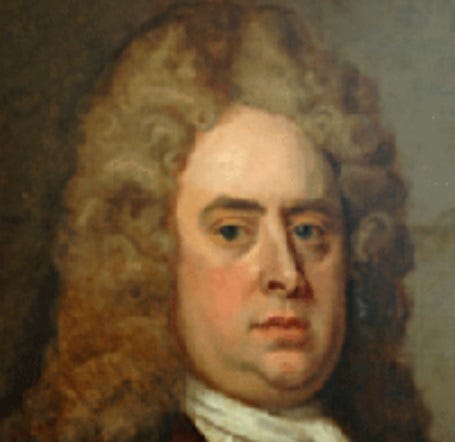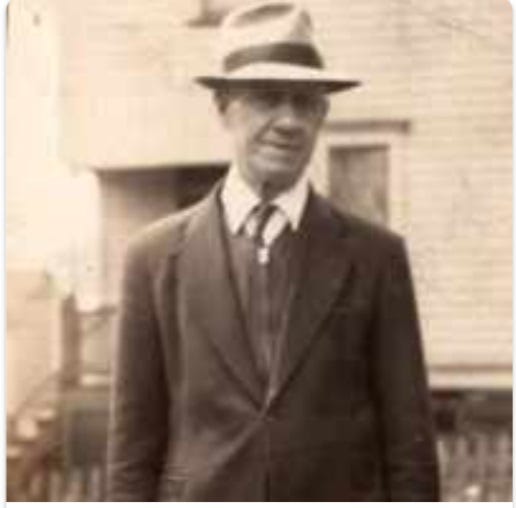On being a member of a political dynasty
Someone must have made a bad land deal along the way
George Vaughn was born in 1676 in Portsmouth, Province of New Hampshire. George’s grandfather, also named George, hailed from Glamorgan, Wales.
In 1697, George married Mary Belcher, whose brother Jonathan would serve simultaneously as the governor of New Hampshire and Massachusetts Bay Colony from 1730 to 1741 and six years later become the governor of New Jersey.
But Mary would die two years later without producing any children who survived infancy, and George married Elizabeth Eliott in 1700.
George joined a local militia—these were not as frowned on then as now—and thanks to some combination of ambition and proper soldiership was appointed lieutenant governor of New Hampshire in 1716. He was removed from office one year later for arguing he should have more authority over the province, since the governor, John Dudley, was also the governor of Massachusetts Bay and spent all his time there.
Despite George’s rambunctious politicking, George and Elizabeth had eleven children, including Mary (b. 1713). Mary married one Cutt Shannon, also of Portsmouth, in the early 1730s. Their first of eight children, Richard, died in infancy, so when they had another son two years later, they named this one Richard also.
Richard married Elizabeth Ruggles (of the Connecticut Ruggleses), and the second of their ten children, Elisabeth, was born in 1776, when the colonies decided to become a separate country instead. This action (the revolt, not Elisabeth’s birth) was met with considerable resistance by the King of England (yet another George), but despite all the muskets and syphilis and sweeping privations typical of people living in food deserts under collapsing authoritarian rule, Elisabeth survived the Revolutionary War.
Elisabeth married Benjamin Swallow Tucker of Hillsborough County, New Hampshire, which had achieved statehood in June 1788, the ninth of the “Original Thirteen” colonies to ratify the United States Constitution. They had eight children and, in a twist I suspect was once more common than I would have guessed, had to try three times to produce a son named Benjamin who lived more than a year.
Capitalizing on his random survival, Benjamin Ruggles Tucker (b. 1803 in Penobscot, Maine) married Paulina York, and the couple had a wildly listless four children. The first of these, Martha, married Henry C. Blake of Pepperell, Massachusetts in the mid-1840s. Their second of four children, Edgar, was born in 1850 in Pepperell and married Achsah Whitney sometime during post-Civil War Reconstruction. In 1888, Edgar and Achsah had their only child, a son. They named him Rodman Ruggles Blake.
Rodman married Marion Lunt late in the first decade of the twentieth century. Perhaps recalling his loneliness as an only child, Rodman endeavored with his wife to have nine children. The fourth of these, Winston Lewis Blake, was born in 1918 in Vermont.
In the late 1930s, Winston marred Rosamond Urquhart, a native of Stoneham, Massachusetts whose lineage can be traced through Nova Scotia to a castle in Scotland. The couple would settle in Concord, New Hampshire, where both worked for the State of New Hampshire, Win as a Fish and Game dispatcher and Roz as a librarian. Their third child and only daughter, Martha, was born in Concord in 1947, and in May 1969 married a man named William Beck, an Ohio native who had migrated to New Hampshire after his stint in the U.S. Air Force during the Vietnam War.
William and Martha had two children, also born in Concord. One is my sister, the only one of us living in, or for that matter anywhere near, New Hampshire today.
The point being, my great-great-great-great-great-great-great-great-grandfather was the lieutenant governor of the state I was born in, and he was born in the same town my mother later worked in for years before retiring around ten years ago. It does make sense than someone from New England would have a few ancestors from Old England and the other portions of that island.
These discoveries were part of some electronic wandering I did thanks to memories triggered by Father’s Day. Because I grew up next door to my maternal grandparents, I learned a lot that side of my family’s history, given the limitations of no Internet, because my grandmother became interested in genealogy later in her life and as a librarian knew how to hunt.
Almost everything on my father’s side is murky. I never met my paternal grandfather, Joe, a construction worker who died in around 1960 his early forties of cardiac arrest in the aftermath of an on-the-job accident. I believe this grandfather’s ancestors hailed mainly from France and Germany, two longtime allies across the pond.
My dad’s grandmother, Emily (David) Beck, lived to be 100 and about one month despite much of this life being spent in the Orlando, Florida area. Her parents, Alfred and Eliza Davis, were born in England in 1868 and 1876, respectively, emigrating to the United States with their (hopefully different) parents shortly before the turn of the century.
I dug up this photo of my great-grandfather Alfred Davis.
And on those Ruggleses: There was a tourist attraction called Ruggles Mine in Grafton, New Hampshire that closed to the public in 2016, and I assume some of the above characters had relatives who were into chasing ores. And according to the site I used to learn most of this, familysearch.org, the name was changed to “Ruggles” from “De Ruggele” in the 1300s. Yes, the 1300s. I have an ancestor named Rogyll De Ruggele who was born in 1360. Then someone decided to invent English, a language many native speakers still struggle to master to this day.




